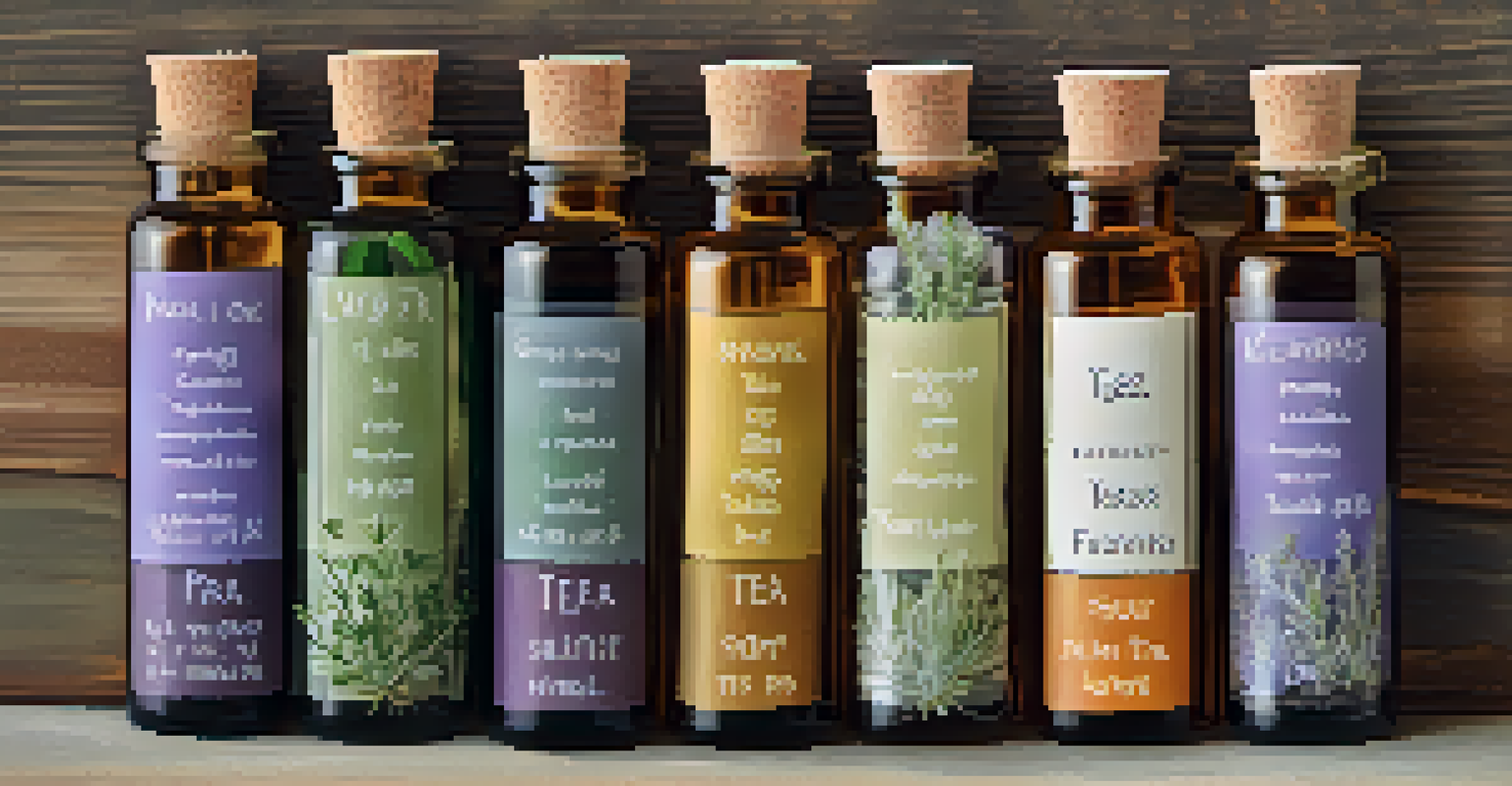Aromatherapy Techniques for Enhancing Naturopathic Treatments

Understanding Aromatherapy in Naturopathy
Aromatherapy is a holistic healing practice that uses essential oils to improve physical and emotional well-being. In the context of naturopathy, it serves as a supportive therapy alongside other natural treatments. By harnessing the therapeutic properties of plants, aromatherapy can enhance the overall effectiveness of naturopathic care.
The use of essential oils for therapeutic purposes is a powerful method of enhancing emotional and physical well-being.
Essential oils, extracted from various plants, have distinct properties that can aid in healing. For instance, lavender is known for its calming effects, while peppermint can invigorate and stimulate. Integrating these oils into naturopathic treatments can create a more personalized and comprehensive healing experience for patients.
Moreover, the olfactory system plays a crucial role in how we perceive scents and can influence our emotions and memories. This connection makes aromatherapy an effective tool in addressing both physical ailments and emotional challenges, fostering a deeper connection between mind and body.
Essential Oil Selection for Naturopathic Treatments
Choosing the right essential oils is key in enhancing naturopathic treatments. Each oil has unique properties that can target specific health issues, so understanding these can greatly benefit practitioners. For example, tea tree oil is renowned for its antibacterial qualities, making it an excellent choice for skin conditions.

Practitioners should also consider the patient's individual needs and preferences when selecting oils. A personal connection to a particular scent can enhance the therapeutic experience. This tailored approach not only improves the effectiveness of the treatment but also fosters a sense of comfort and trust between practitioner and patient.
Aromatherapy Enhances Naturopathy
Aromatherapy uses essential oils to support physical and emotional healing, complementing naturopathic treatments.
Additionally, it's important to ensure that the essential oils used are of high quality and sourced sustainably. This not only promotes better health outcomes but also aligns with the naturopathic principle of treating the whole person, including their environment.
Methods of Application in Aromatherapy
There are several methods to apply essential oils in aromatherapy, each offering unique benefits. Inhalation is one of the simplest and most effective methods, allowing the oils to enter the bloodstream quickly through the lungs. This can be done using a diffuser, oil burner, or simply by adding a few drops to a tissue.
Aromatherapy is about creating an atmosphere of healing through scent, allowing the body and mind to restore balance.
Topical application is another popular method, where essential oils are diluted with a carrier oil and applied directly to the skin. This approach allows for localized treatment and can be particularly effective for muscle pain or skin conditions. However, caution is needed to avoid skin irritation, so always conduct a patch test first.
Lastly, baths infused with essential oils can provide a calming and rejuvenating experience. Adding a few drops of calming oils like chamomile or ylang-ylang to a warm bath can enhance relaxation and relieve stress, making it an excellent complement to other naturopathic treatments.
Creating a Relaxing Environment with Aromatherapy
Aromatherapy can significantly enhance the healing environment in naturopathic practices. By incorporating soothing scents into treatment spaces, practitioners can create an atmosphere that promotes relaxation and healing. For instance, diffusing calming essential oils like bergamot or sandalwood can help patients feel more at ease.
The environment plays a crucial role in the effectiveness of any treatment. A pleasant aroma can reduce anxiety and enhance the overall experience, allowing patients to be more open to healing. This aligns with the naturopathic philosophy of treating the whole person, including their emotional and psychological state.
Personalized Essential Oil Selection
Choosing the right essential oils based on individual needs enhances the therapeutic experience and builds trust between practitioners and patients.
Furthermore, encouraging patients to use aromatherapy at home can extend the benefits beyond the clinic. Simple practices, such as using scented candles or essential oil sprays, can help maintain a calming atmosphere in their daily lives, reinforcing the positive effects of their naturopathic treatments.
Combining Aromatherapy with Herbal Medicine
Aromatherapy can beautifully complement herbal medicine, another cornerstone of naturopathic treatment. Both modalities focus on harnessing the healing properties of nature, making them a perfect partnership. For example, while herbal teas may provide internal support, essential oils can enhance the therapeutic experience externally.
Practitioners can create synergistic blends that combine herbal remedies with specific essential oils. This approach allows for a more comprehensive treatment plan, addressing multiple aspects of a patient's condition. For instance, a patient dealing with anxiety could benefit from a calming herbal tea alongside a soothing lavender oil.
Moreover, educating patients on how to use both therapies at home can empower them in their healing journey. Simple instructions on combining herbal remedies with aromatherapy can enhance their overall well-being, creating a holistic approach to health.
Utilizing Aromatherapy for Emotional Healing
Aromatherapy can be particularly effective in addressing emotional and psychological issues. Essential oils like frankincense and ylang-ylang are known for their mood-enhancing properties, making them valuable tools in emotional healing. Integrating these oils into treatment plans can support patients dealing with anxiety, depression, or stress.
The process of inhaling these oils can trigger emotional responses, allowing patients to access and process their feelings more easily. This can be especially beneficial during naturopathic treatments that focus on emotional well-being, such as counseling or stress management.
Safety is Crucial in Aromatherapy
Proper usage and dilution of essential oils are vital to ensure safety, especially for vulnerable populations like children and pregnant women.
Encouraging patients to incorporate aromatherapy into their daily routines can also help maintain emotional balance. Simple practices, such as using calming oils in a diffuser or applying them during meditation, can provide ongoing support and enhance their overall mental health.
Safety Considerations in Aromatherapy
While aromatherapy offers numerous benefits, safety is paramount. Essential oils are potent and should be used with caution, especially in young children, pregnant women, or those with certain health conditions. It’s essential for practitioners to educate patients about proper usage and potential contraindications.
Dilution is key when applying essential oils topically, as using them undiluted can cause skin irritation or allergic reactions. A general rule of thumb is to mix essential oils with a carrier oil, such as jojoba or coconut oil, before applying them to the skin. This ensures safety while still delivering therapeutic benefits.

Moreover, practitioners should stay informed about the latest safety guidelines and research regarding essential oils. This commitment to safety not only protects patients but also enhances the credibility of naturopathic practices, ensuring that patients feel confident in their holistic care.